NHS Wales: 'Not worse than in England' poll suggests
- Published
Almost half of the people in Wales believe the Welsh NHS performs just as well as the health service in England while another 15% think it performs better, a new poll suggests.
The NHS in Wales has been called "substandard" by ministers at Westminster over the last year.
Almost 47% of people thought the performance of the Welsh NHS and English NHS is "more or less the same".
But 21% thought performance was worse in Wales, the ICM/BBC Wales poll found.
Health Minister Mark Drakeford said the poll shows once again how people across Wales "value and respect the approach we have taken" in respect of the NHS.

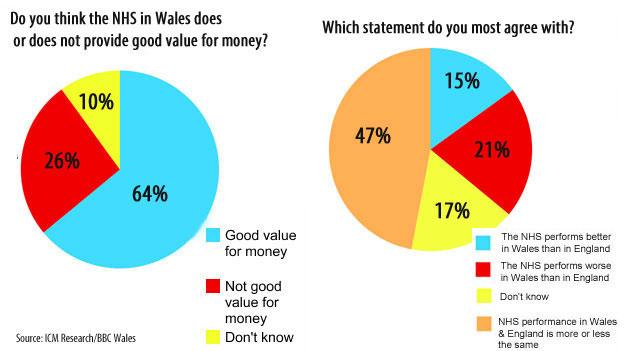
Carwyn Jones's government might also be heartened by another finding in the poll for Healthcheck Wales, a series for BBC Wales examining the health service.
It suggests almost two thirds of the Welsh public (64%) think the NHS is good value for money. Just over a quarter (26%) thinks it does not.
Over recent years, the funding decisions of the Welsh government over the NHS have been criticised.
The Welsh government has come under a sustained attack by the Conservatives in particular for choosing not to protect health spending to the same extent as in England and Scotland in the years following the last assembly election.
Prime Minister David Cameron described Offa's Dyke as becoming "the line between life and death".
Currently the Welsh government spends 43% of the total budget on health. Our poll suggests 48% believe that balance is just about right - although 41% say health should get more money.
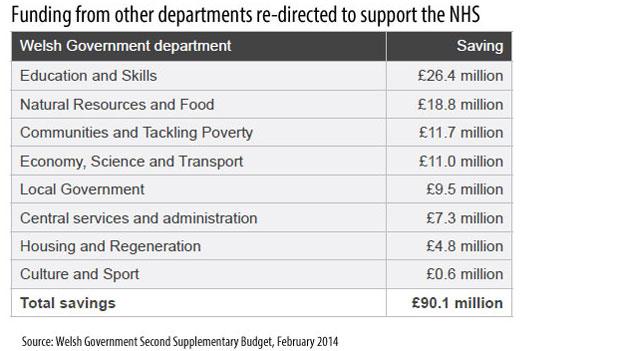
But more recently the Welsh government has pumped hundreds of millions of pounds into the health budget to try to respond to increasing demand - in doing so it has taken money away from other areas (see the table above)., external
48% of those polled thought the Welsh government had been wrong to take money away from other areas and departments - like councils - although 38% thought the decision was correct.
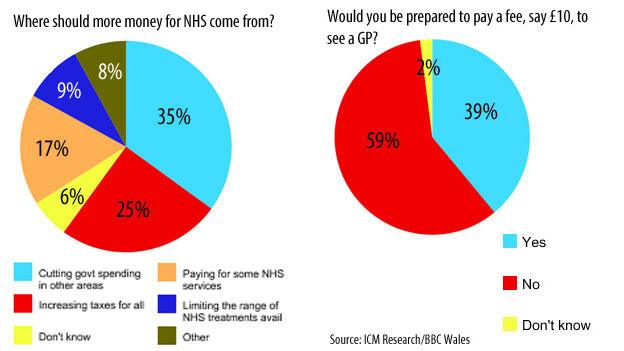
It is likely the NHS will need more money in the future to treat more patients and invest in new equipment and drugs but the public seem divided as to where that money should come from.
35% think extra NHS funding should come from cuts to other departments
25% think taxes should rise to fund the health service
Only 9% think the NHS should limit or cut back on some of the service it provides. But 17% would be willing to pay for certain services such as for seeing a GP
Further, a significant minority - 39% - would be willing to pay say a £10 to guarantee they see a GP at a time of their choosing but 59% would not
Saying this an overwhelming majority (81%) think people who don't turn up to a GP or hospital should be fined.


What is clear is that in coming years the Welsh NHS will face several pressures - namely how to improve quality of care at a time of challenges of rising costs and increasing demand, during a period of austerity.
The health minister a year ago called for a public debate about reshaping the NHS around the principles he'd described as "prudent medicine" or "prudent healthcare".
Discussions are continuing but in practice it could mean:
Not offering patients surgery - for example to remove tonsils - if it was considered to be of little benefit.
Limiting the amount of drugs used for chronic pain management and reducing the number of antibiotics prescribed by GPs.
Only if the treatments don't work or care is more complicated, should expensive treatment be offered.
Nobody should be seen routinely by a consultant, for example, when their needs could be appropriately dealt with by an advanced nurse practitioner.
Central to prudent healthcare is also the idea that a patient's clinical need matters most when it comes to deciding NHS treatment.
And on that point, according to our poll it seems the Welsh public are in agreement - a large majority 69% agreeing that treatment for non life-threatening conditions should be given on the basis of need (or how urgently a patient needs the treatment). 29% think all patients should be treated equally and have to wait their turn on the waiting lists.
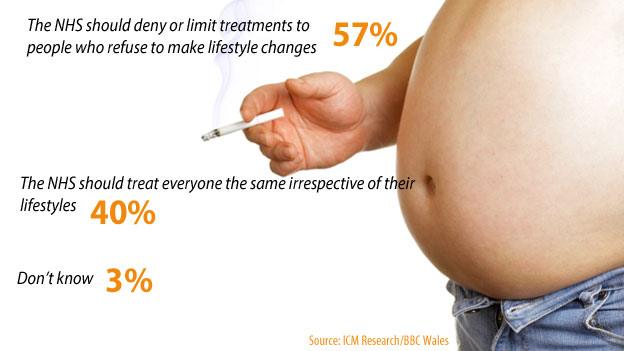
Another element is that people should take more responsibility for their own health.
According to the minister, while three decades worth of public health campaigns have increased people's awareness of the impact of unhealthy lifestyles on health, it has done little to change people's behaviours.
Mark Drakeford talks of the need for a new contract between people and the NHS.
In recent years, for example, Cardiff and Vale Health board have introduced a policy which meant smokers and very obese would only be offered planned surgery if they had completed a smoking cessation or weight loss programmes. Other health boards have been following how the scheme works.
But it seems from our poll that a majority public would be willing to go further. More than half say the NHS should limit or refuse treatment for those who refuse to make lifestyle changes. But a significant minority - 40% - believed the NHS should treat everybody equally irrespective of lifestyle choices.

ANALYSIS by Prof Marcus Longley, director of the Welsh Institute for Health and Social Care
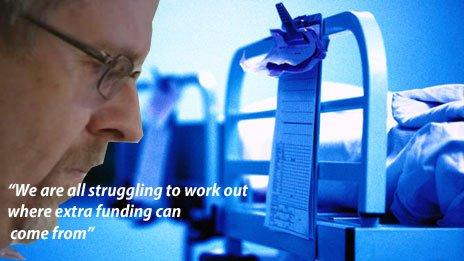
This poll reveals an NHS under real strain. Our love affair with the health service is still strong, but about a third of us are now dissatisfied with the way its run. The problem? We think it is underfunded. Almost half of us are prepared to see other public services cut to fund the NHS better, while only a quarter are prepared to see taxes increased.
So who's to blame? Only about a fifth of us believe that things are better in England. Rather we tend to blame ourselves, with more than half of us prepared to restrict or deny treatment to people who refuse to make lifestyle changes (rising to three quarters among Conservative and UKIP supporters), and four out of five people are prepared to fine those who don't turn up to appointments.
Are the public right? Yes, more or less. The NHS is still fundamentally sound (the Welsh public acknowledge it offers good value for money), but right across the UK its struggling. Part of its problem is coping with changing lifestyles, and we are all struggling to work out where extra funding can come from.
Does the poll offer a solution? Well, if the problem is money, but people aren't prepared to pay more in taxes (even a majority of Labour voters rejected this).
If cutting other public services can actually damage the NHS, so might even be self-defeating; if demands on services can only increase; and if England doesn't offer a panacea, then should we despair?
No. We need to transform the NHS into a new service - same principles (free and equal for all), but one which really prioritises supporting people to remain independent, rather than waiting for them to fall over. And that's much harder than bunging a few more millions at the problem.


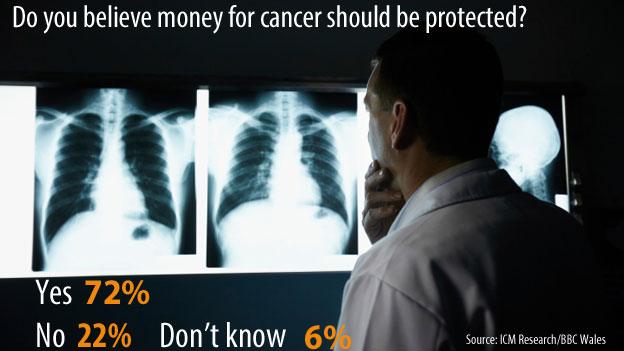
One of the biggest differences in health policy between Wales and England, is that in England to a certain extent cancer is treated differently to other illnesses. That is because a cancer drugs fund exists which allocates hundreds of millions of pounds of the health budget to pay for expensive drugs that have not been approved as cost effective for widespread use in the NHS.
The Conservatives argue some patients in Wales, by not having access to this pot of money are being denied treatment that could extend their lives.
The Welsh government argues the fund is not supported by the majority of doctors and is inherently unfair as it gives protected funding to cancer above that provided to patients with other illnesses.
In our poll we asked: "In England, NHS money is ring-fenced for the cancer drugs fund. In Wales, funding for cancer drugs is treated in the same way as funding for drugs for all other illnesses. Do you believe money for cancer should be protected?"
But our poll suggests most people do believe money for cancer drugs should be protected - 72%.
The Welsh government told us it had serious concerns about the wording of the poll question.
"It does not make clear that the cancer drugs fund ring-fencing in England is at the expense of funding for drugs for other conditions or that spending on cancer is higher per head in Wales than in England," it said.
"The fact that the cancer drugs fund in England supports drugs which have not been approved by the National Institute for Health and Care Excellence (NICE) for routine use means the question does not give respondents enough information.
"Simply asking whether 'money for cancer should be protected' is a gross oversimplification of the issue."


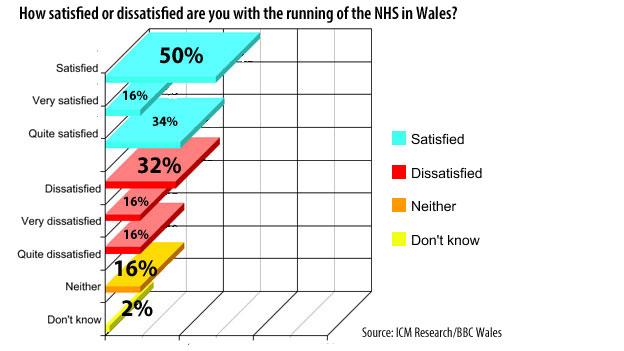
The answers giving difference levels of overall satisfaction
But perhaps the key question at the end is just how satisfied are the Welsh public with the running of the NHS in Wales.
Half of the people said they were satisfied while a significant minority - almost a third (32%) were not. The question is, is that good news for the Welsh government after a year of criticism, or does it show many feel improvements can and should be made?
At the very least it's reflection perhaps that people are genuinely concerned about the pressure facing the system and on the frontline.
ICM Research interviewed a random sample, of 1,004 adults aged 18+ by telephone on 8-13 January 2015. Interviews were conducted across Wales and the results have been weighted to the profile of all adults. ICM is a member of the British Polling Council and abides by its rules.

Story update 10 September 2015
On 4 September 2015, the Market Research Standards Board of the Market Research Society (MRSB) upheld a complaint from the Welsh government regarding the wording of the question on the funding of cancer drugs in an ICM poll commissioned by BBC Wales.
The MRSB ruled that the question concerning funding for cancer drugs was leading participants to a particular point of view. It also determined that the question sign-off policy and procedure in place by ICM on this occasion was insufficient.